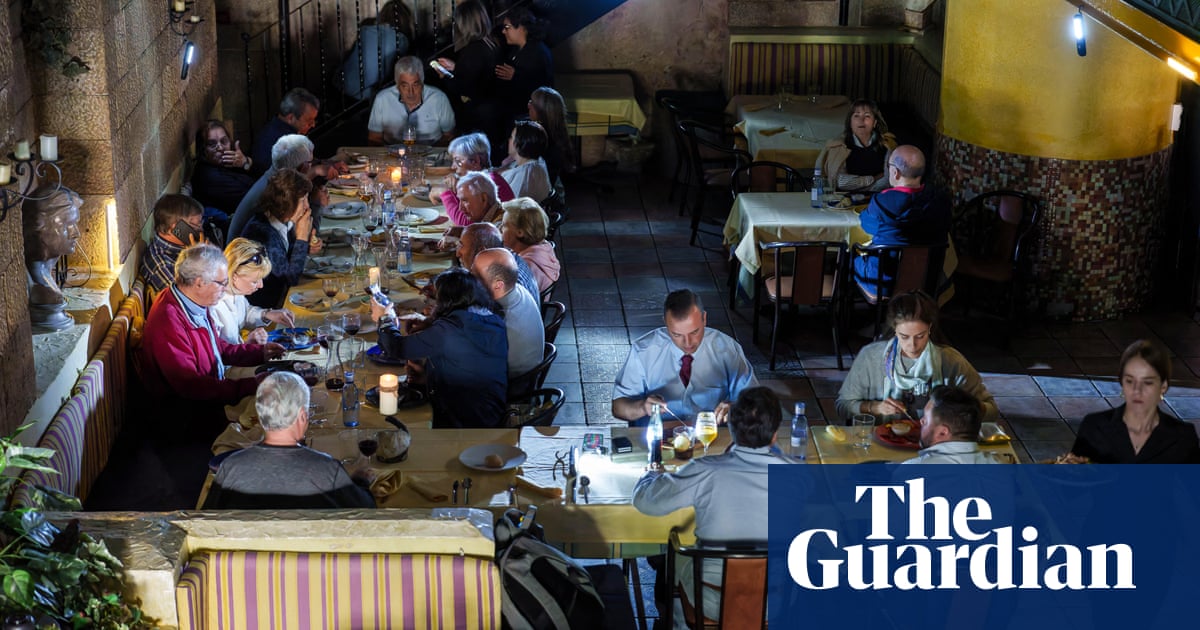It was the moment the lights went out. In a post-match interview, after her straight sets win to reach the last eight of the Madrid Open, American tennis star Coco Gauff was joking about her avocado toast breakfast and bad night’s sleep, when suddenly the microphone cut. She looked surprised, while behind her the LED ad boards turned black.
It was just after midday and all across the Iberian peninsula thepower was failing, plunging Spain and Portugal into chaos. Buses and trains stopped; cash machines went dark; people were left trapped in unlit metro carriages and lifts, with no certainty about when they would get out.
Madrid residents packed into outdoor terraces and gathered around radios trying to figure out what was happening. Cars got stuck in long snaking queues because there were no lights to guide the traffic. Sirens blared constantly as police cars and ambulances tried to make their way through jam-packed streets.
One officer told the Guardian that when the power went out the Madrid metro came to a dead stop and people had to be pulled out of carriages. Carlos Condori, a 19-year-old construction sector worker, was travelling on the metro, but his train managed to crawl up to a platform. “People were stunned because this had never happened inSpain,” he told AFP. “There’s no [phone] coverage, I can’t call my family, my parents, nothing: I can’t even go to work.”
In the Spanish capital, neighbours spilled out of their homes, mingling with workers from offices and stores, trading stories. Most assumed it was a localised power cut that would be restored swiftly. They were wrong.
The Spanish and Portuguese governments scrambled to hold crisis meetings. The Spanish parliament closed and play at the Madrid Open was suspended. Clothing company Zara closed its flagship store in Madrid, although other shops allowed customers to browse their wares in the dark.
The day had started ordinarily enough. Antonio Loreto, a PhD student at the Autonomous University of Barcelona, told the Guardian that the electricity had gone off in his lab at 12.30pm, although he and colleagues soon realised the problem was much bigger. “When people noticed it was in the whole university everyone got nervous. Then someone said it was the whole of Catalonia, then all Spain. We realised no one had cellphone reception. People started to panic. Some said it could be the start of world war three, and without internet or mobile phone people started to get a bit paranoid.”
With uncertainty about the causes of an unprecedented blackout running high, misinformation and rumours flew. The European Commission president, Ursula von der Leyen, was wrongly reported to have described the incident as an attack on the European energy grid. She had said no such thing.
A few hours later von der Leyen tweeted that she had been in touch with Spain’s prime minister, Pedro Sánchez, reaffirming a previous statement that EU authorities were “monitoring the situation” with national authorities and the EU’s electricity coordination group. The EU energy commissioner, Dan Jørgensen, reported at 2.28pm that “power is already back in some regions”.
But chaos was still reigning in large parts of the Iberian peninsula.
Thousands of people were stranded on the Madrid-Barcelona high-speed railway line. One train heading for Barcelona stopped at 12.50pm, according to an El País report. Within minutes the lights went out and air conditioning stopped. Passengers could not even get into the train toilets, which were connected to the electricity system, and had to use some bushes by the track. “Get off two by two and come back immediately after relieving yourself,” the paper reported one attendant saying. The crew tried to provide information but admitted that they didn’t really know what was going on.
Jason Ence, a Guardian reader, reported in the early afternoon: “We are stuck on a Renfe train from Seville about 30-40 miles south-west of Madrid near Toledo. We are just stopped on a curve with no real way to be rescued should it come to that.”
Hospitals in Barcelona, Galicia andPortugalturned to back-up generators, local media reported. Prescriptions were once again being written by hand; x-rays and medical test results could not be viewed. Meanwhile hundreds of petrol stations closed across Spain and Portugal, because pumps were inoperable and card systems had failed.
While Spain’s airports turned to generators and some flights were delayed, travellers in Lisbon were left waiting for news about their flights.
Spanish media reported from Barcelona that radios, batteries, candles and torches were “flying off the shelves” at the bazaars on Calle del Mar. People scrabbled for cash to buy their lunch, as ATMs didn’t work. In some restaurants diners ate by candlelight.
Back in Madrid, Pilar Lopez, a 53-year-old administrator, suggested the chaos provided a useful lesson. “I can’t even pay because my mobile isn’t working. Sometimes you have to be a bit more analogue: this proves it,” she told AFP.
She added: “We’ve suffered a pandemic, I don’t think this is worse.”
